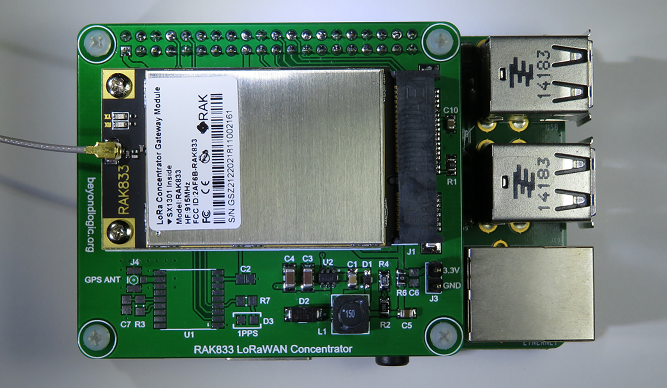
Contents
[hide]Design Files
Open source design files including Gerbers for the RAK833 LoRa Concentrator Hat can be obtained from Circuit Maker. Circuit Maker is a free PCB design tool from Altium. Designs can be imported into Altium Designer.
Description
This board is a Raspberry PI Hat for the RAK833 LoRa Concentrator Gateway Module.
It is smaller version of the popular RAK831. The RAK831 is larger, about the same footprint than a Raspberry PI and requires a breakout board to convert the RAK831’s 24 pin connector to the Raspberry PI’s 40 pin connector. The RAK833 is a more elegant industry standard PCI Express Mini Card form factor (Type F2).
The RAK833 module consists of a Semtech SX1301 Digital Baseband chip for outdoor LoRaWAN Macro Gateways and two Semtech SX1257 Transceivers. The USB interface is provided by an FTDI FT2232H.
It supports both a USB and SPI interface selectable via the SPDT_SEL pin. This makes the module ideal for Raspberry PI and other Embedded Linux platforms that do no expose USB on the expansion connector.
Variants of the module are available for four different frequency ranges, 433MHz, 470MHz (China), 868MHz (Europe) & 915MHz (North America) and with or without the USB interface (FT2232H).
The RAK833-SPI/USB-xxx Mini PCie Module can be purchased from AliExpress for US$119. The non-USB version, the RAK833-SPI-xxx is US$99
Pinout
The following table provides details of the allocated I/O.
| Pin No. | PI Name | PI I/O Type | Net Name | Function |
| 8 | GPIO14/TXD0 | OUTPUT | UART_TX | GPS Receive (For configuration) |
| 10 | GPIO15/RXD0 | INPUT | UART_RX | GPS Transmit |
| 19 | GPIO10/SPI_MOSI | OUTPUT | PCIe_MOSI | SX1301 SPI Slave Input |
| 21 | GPIO09/SPI_MISO | INPUT | PCIe_MISO | SX1301 SPI Slave Output |
| 22 | GPIO25 | OUTPUT | PCIe_RESET | SX1301 Reset |
| 23 | GPIO11/SPI_SCK | OUTPUT | PCIe_SCK | SX1301 SPI Clock |
| 24 | GPIO08/SPI_CE0_N | OUTPUT | PCIe_CSN | SX1301 Chip Select |
Software
Instructions for installing the software can be found at https://github.com/Lora-net/packet_forwarder/wiki/Use-with-Raspberry-Pi
The packet forwarder is configured via a global_conf.json file. Pre-prepared configuration files for different frequency plans/countries on The Things Network can be obtained from https://github.com/TheThingsNetwork/gateway-conf/